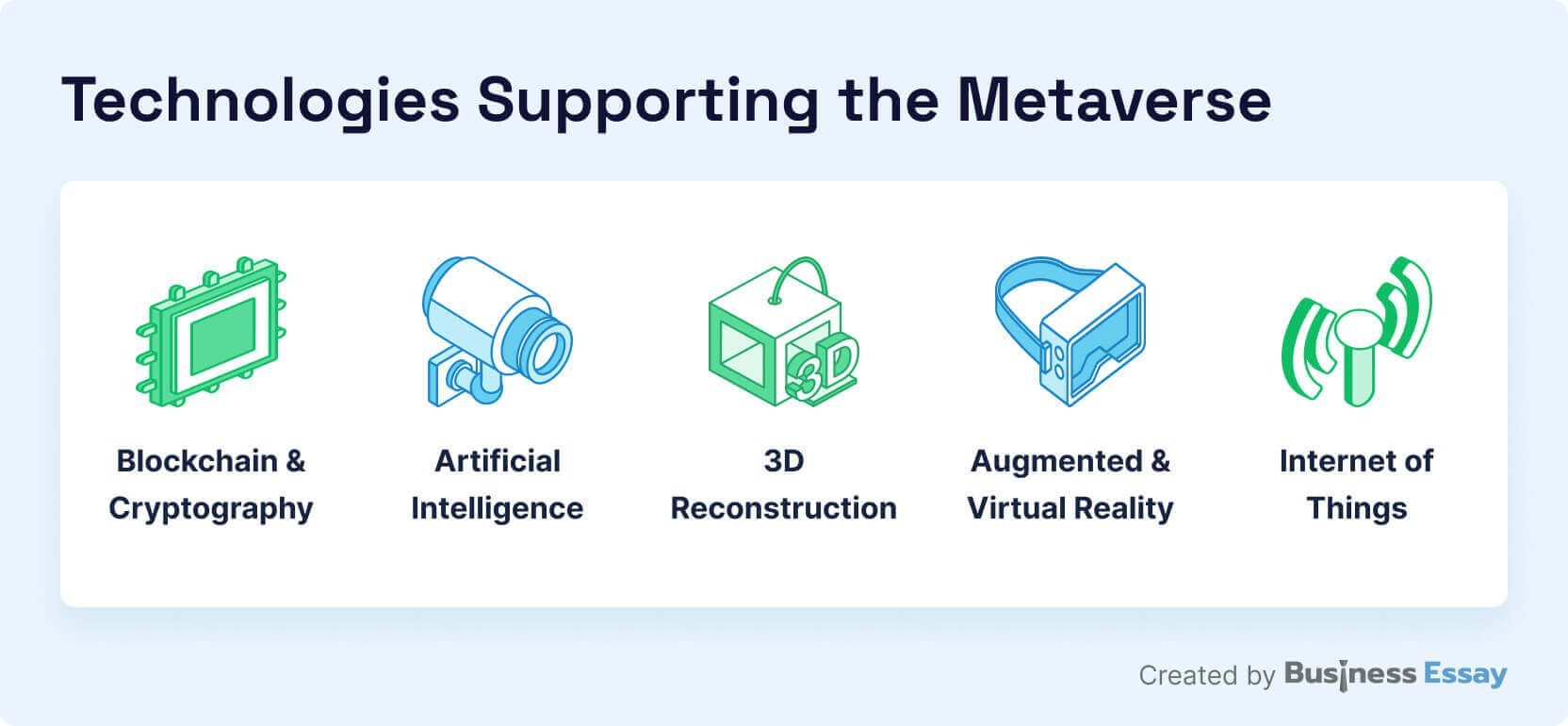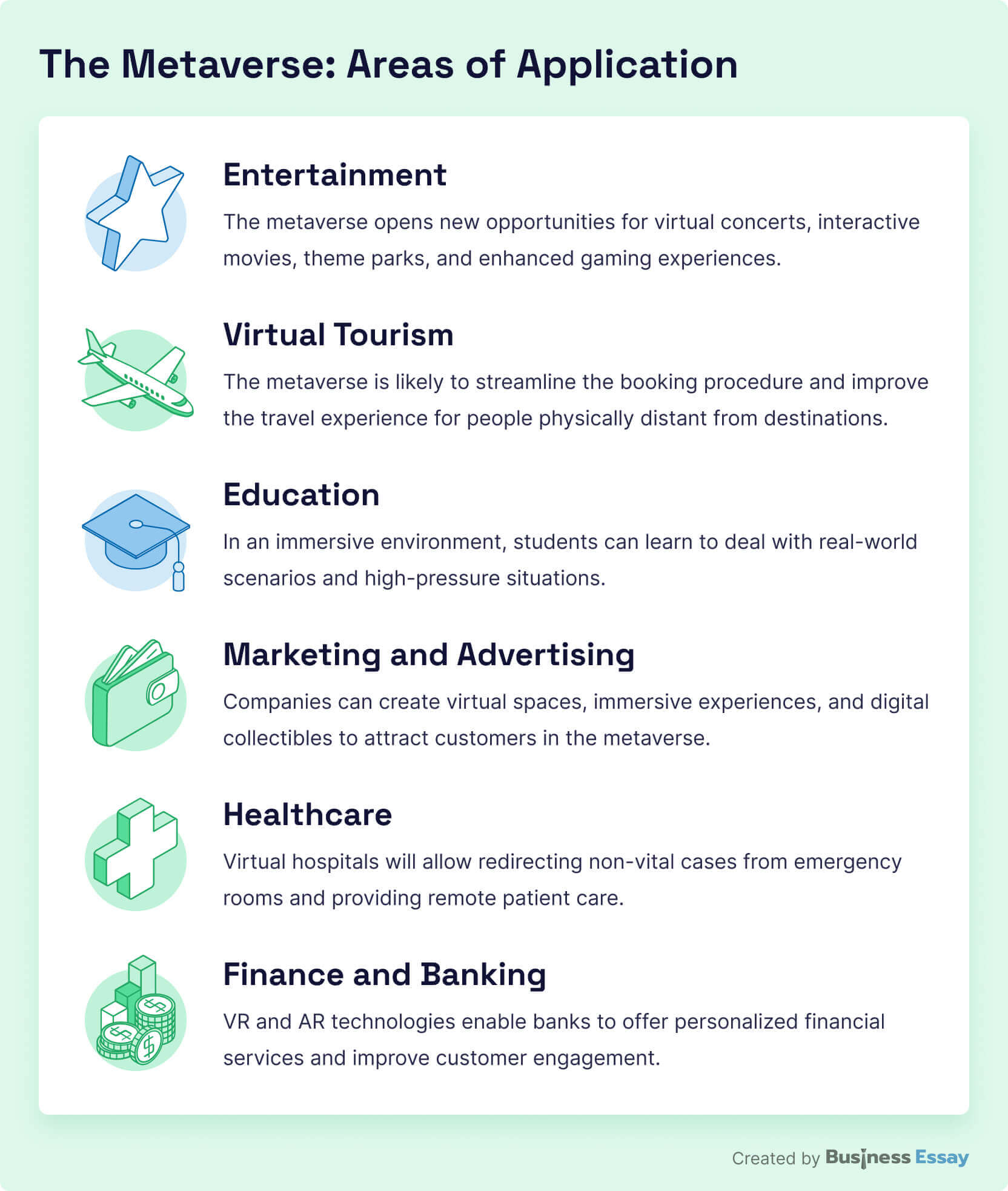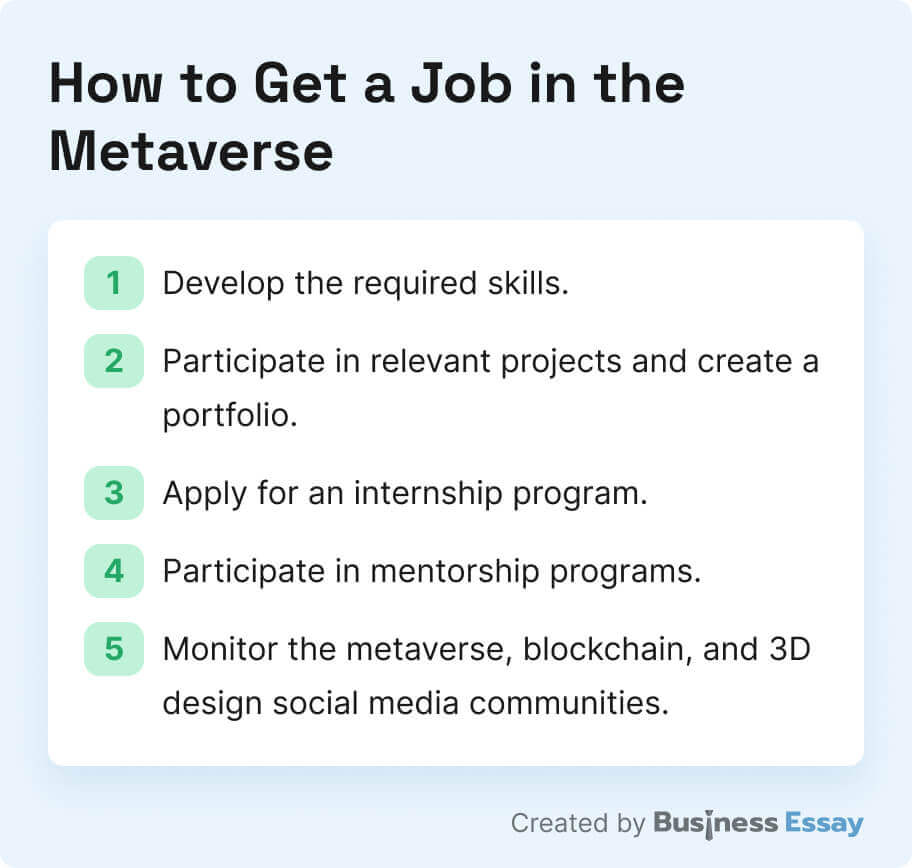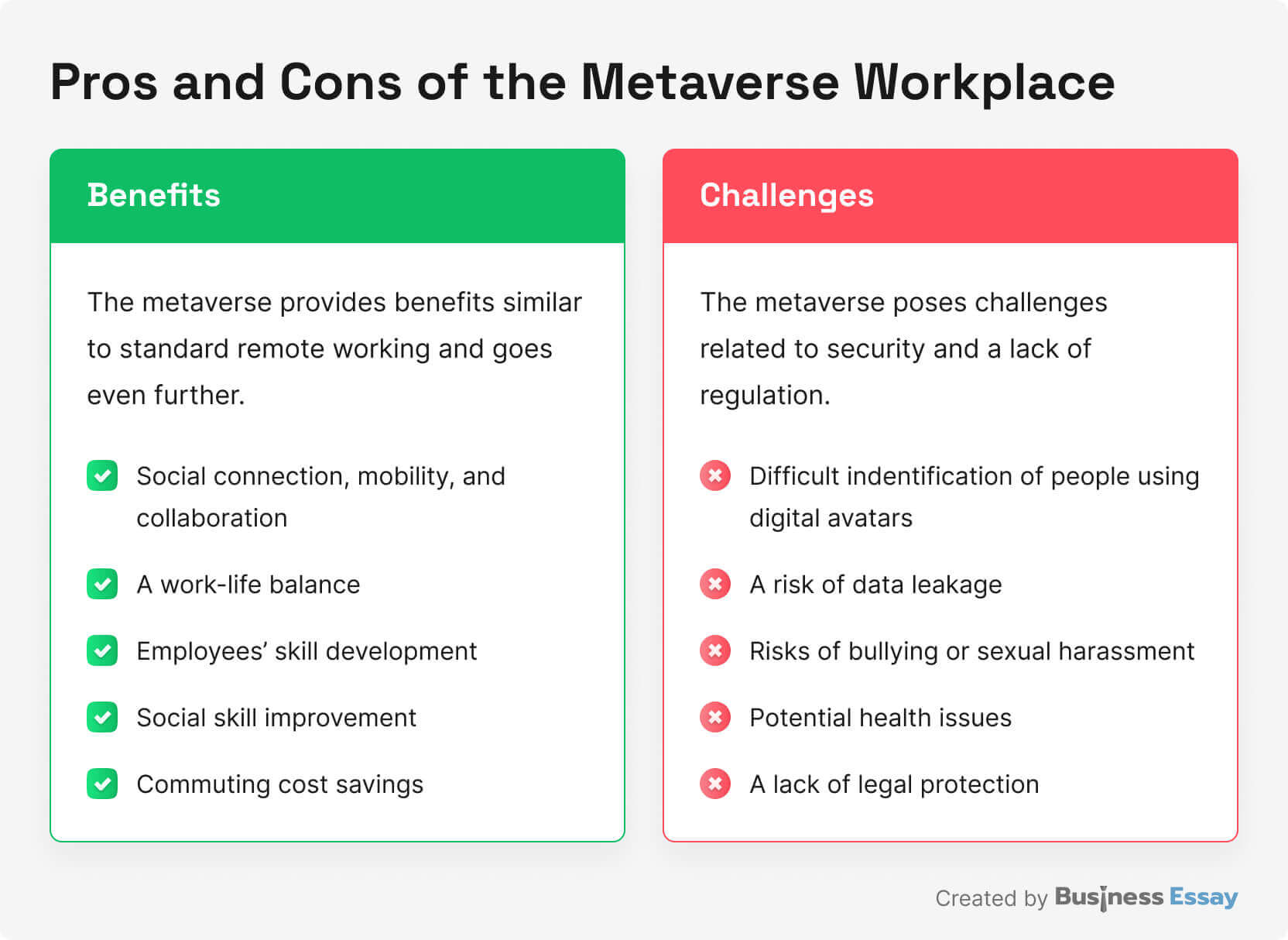
The tech industry is full of buzzwords, and everyone’s talking about the metaverse right now. The metaverse is a virtual world where we can live, travel, play, and even work. Even though the metaverse doesn’t exist yet, many famous companies like Meta (formerly Facebook), Disney, Gucci, and Coca-Cola have already gotten involved.
While some people see the metaverse as science fiction, others consider it an opportunity to start a new, exciting, high-paying career. Meta’s CEO, Mark Zuckerberg, claimed that in the next five years, the company would reportedly create 10,000 jobs to bring their plans to life. This article will cover everything you need to know about careers in the metaverse, their benefits and challenges, and how you can get a job in virtual reality.
And don’t miss our database of essays that will help you on your way to your metaverse career!
🔤 Quick Metaverse Glossary
📖 Everything You Need to Know about the Metaverse
Mark Zuckerberg refers to the metaverse as the future of the internet. However, it’s hard to say if this future will look like a video game or a more advanced version of Zoom. Even though the metaverse remains a vague phenomenon, in this article, we’ll dig deeper into its origin and unique features.
What Is the Metaverse?
The metaverse represents the 3D virtual reality where people can socialize, work, and play as avatars (digital representations of their identities). Many companies hope the metaverse will also introduce a new digital economy, allowing users to create, buy, and sell goods. Unlike Zoom conferences, the metaverse doesn’t disappear when you leave the meeting. Other people can access it anytime with the help of VR or AR technologies, PCs, game consoles, and smartphones.
For now, the term “metaverse” doesn’t refer to any specific type of technology. Instead, this concept describes the future of technological infrastructures and how people will interact with them.

Where Does the Metaverse Originate from?
Even though the metaverse is still emerging, this concept dates back decades. In 1992, science-fiction author Neal Stephenson predicted the emergence of virtual worlds and cryptocurrencies in his novel Snow Crash. The book’s protagonist, Hiro, travels around a place called the metaverse, which has many similar traits to its modern version, such as:
- The metaverse is three-dimensional and imitates the real world.
- Users interact with the metaverse through a first-person perspective and have customizable avatars.
In 2021, the term “metaverse” was chosen by Collins Dictionary for its Top 10 Words of the Year. It happened soon after Facebook was rebranded into Meta and announced its intention to invest at least $10 billion into the development of the metaverse. In addition to Meta, tech giants like Google, Microsoft, Nvidia, and Qualcomm are working on their versions of the virtual world.
What Technologies Support the Metaverse?
Many companies are now on a mission to make the metaverse more immersive. Consider these examples of powerful technologies that will allow a more realistic digital experience in the future.
What Might the Metaverse Look Like?
If you want to experience the metaverse first-hand, there’s already a solution. Instead of waiting until it becomes available, you can check out these projects that might become prototypes for the future metaverse:
- Decentraland: Metaverse for Gamers
Decentraland is a virtual reality platform led by its unique cryptocurrency token, MANA. In this realistic and immersive virtual world, users can buy land, host live events, play games, and create and sell NFTs. Another outstanding feature is that the platform is fully regulated by users who vote for feature upgrades and optimization. - Upland: Metaverse for Real Estate
Upland is the most significant virtual space mapped to the real world. Upland allows users to become digital landowners and build properties while earning UPX coins (utility tokens used in Upland). Essentially, you can buy your actual home address or favorite bar, but in virtual reality. All the properties are represented via NFTs, allowing people to benefit from the real estate of both worlds. - Nvidia Omniverse: Metaverse for Designers
NVIDIA Omniverse is a platform for the virtual collaboration of designers, businesses, and artists all around the globe. It uses real-time and physically accurate simulation to guarantee an amazing visualization experience. Moreover, the platform uses multiple AI-operating digital assistants to enable users’ avatars to provide real-time language translation.
👩💻 The Metaverse and the Future of Work
The metaverse has the potential not only to create new jobs but also to change our working environment radically. Organizations of all kinds have demonstrated interest in metaverse projects, including those in the entertainment, IT, education, and healthcare sectors. So how exactly will the metaverse affect the future of work?
The Metaverse’s Areas of Application
Here’re some cases that best illustrate the metaverse’s opportunities for businesses.

Entertainment
Many streaming platforms are now exploring the idea of interactive movies. For example, Netflix is looking for ways to advance its interactive video specials beyond simple yes or no questions.
Another trend involves virtual concerts, which started in 2019 when DJ Marshmello held a live show in the game Fortnite for over 10 million people. A similar strategy could work for sports events, allowing users to attend live games within the metaverse.
Virtual Tourism
Metaverse tourism is in its early days but is expected to grow. In 2022, VR City became one of the most desired destinations for tourists. The platform VR City is a collection of the world’s most famous sights, including the Great Wall of China, the Statue of Liberty, and the Eiffel Tower.
Since the metaverse is fully virtual, designers aren’t limited by the laws of physics. Maybe one day, we’ll be able to go on a trip to Mars or a fantasy world.
Education
During the pandemic, many institutions adopted e-learning platforms and other digital means of communication. However, the emergence of the metaverse will allow them to improve lesson delivery even more by having real-time interactions in a virtual space.
Marketing and Advertising
More and more brands are trying to establish a presence in virtual reality. For example, in 2021, Hyundai Motor Company presented its future mobility projects and current products on the gaming platform Roblox.
Overall, the metaverse will allow brands to connect with customers on a novel, more personal level.
Healthcare
There’s a high chance that virtual hospitals will soon replace traditional patient consultations over the phone. Since the beginning of COVID-19, it became crucial to redirect non-vital cases away from emergency rooms and provide health advice remotely, minimizing contact. Potentially, when the technology reaches a more advanced stage of development, virtual hospitals may allow physicians to realistically examine patients in three dimensions.
Finance and Banking
The emergence of the metaverse might become the next evolutionary stage in the banking and finance industry. By 2030, it’s expected that about 50% of banks worldwide will use AR and VR channels for customer transactions and employee engagement. For example, Bank of America has already launched a VR training program for its employees, simulating real-life customer interactions.
The Metaverse Workplace Trends
Metaverse companies are now developing workplace solutions for video-meeting fatigue and the lack of social interaction in remote work. They aim to design immersive workplaces that will improve employee wellness and team collaboration. Some of the most exciting features of the futuristic offices include the following:
- Live status tracking. Just as in a physical office, you can walk around the halls and see if your colleagues are busy or available for a quick chat.
- Well-being areas. These are spaces for users to take breaks, for example, with the help of guided meditations. Since the opportunities of the metaverse are almost unlimited, well-being areas could even take place on the moon.
- “Bump into” experience. Immersive technology will allow you to see your colleagues in real-time, making it easier to stop their avatars if you need to discuss something. These informal and spontaneous conversations are vital for a healthy working environment.
If you are curious about how to access the metaverse workplace, the most popular gear now includes VR headsets, AR glasses, and other mixed-reality devices. Meta is also pioneering special touch gloves that allow users to interact with virtual objects and experience the texture, movement, and pressure of all office supplies.
🎓 How to Prepare Yourself for the Metaverse Era
Even if the metaverse remains science fiction for some time, specific technical skills can already be to your advantage in the labor market. One piece of research showed that 80% of hiring managers agree that understanding concepts related to the metaverse and VR makes candidates stand out.
The Most In-Demand Skills in the Metaverse
Here are some skills you can train yourself in now to get a high-paying job in the metaverse in the future.
How to Get a Job in the Metaverse
If you’re ready to land a career in the metaverse, check out these useful tips that will help you on your way:
- Build the required skill set by applying to universities with metaverse-related courses or by checking out the online training on Coursera or edX.
- Take part in projects that will add value to your portfolio and improve your visibility.
- Become an intern to get some hands-on experience with metaverse projects.
- Participate in mentorship programs to network within the metaverse world and be aware of future career opportunities.
- Check out the metaverse, blockchain, or 3D design communities on social media to get the latest news first.

💻 Metaverse Careers
The initial idea behind the metaverse was to create a virtual space that would imitate our real world and bring new career opportunities. Common jobs in marketing, customer service, and project management will be seen differently in a virtual environment. We’ve come up with a list of metaverse careers that you should definitely consider.
Entry-Level Metaverse Jobs
Entry-level jobs might be a great start for your metaverse career because they require minimal professional work experience. However, remember that having even beginning design or coding skills will give you a competitive advantage.
Entry-Level Cybersecurity Analyst
As a cybersecurity analyst, you’ll learn how to protect metaverse users from cyber threats and develop protocols to respond to cyberattacks. Many business processes will be held in virtual reality in the future, making the metaverse a vulnerable target for fraud. Therefore, cybersecurity specialists have many opportunities for career development, starting from entry-level positions like this one.
Product Management Intern
The demand for different metaverse products is rapidly rising since more people and organizations are showing interest in virtual reality. Companies will need more people on their project teams to test products, monitor the end-user experience, and launch new ideas.
Metaverse Design Jobs
Avatar Clothing Designer
People have always cared about their looks, and the metaverse won’t be an exception. Avatar clothing designers can work on their own clothing lines and launch special collections with luxury brands like Prada and Balenciaga. In contrast to fast fashion, avatar clothing designers can focus on creating clothing that expresses a user’s individuality.
3D Game Designer
For now, gaming remains one of the leading applications of the metaverse. Undoubtedly, 3D game designers will be highly needed for creating a unique gaming experience. Besides technical skills, this position requires creativity, storytelling abilities, and wide-ranging knowledge of gaming trends.
Metaverse Architecture Jobs
Metaverse Architect
The principal force behind the interaction and mobility of the metaverse is architects. Architects design everything, including buildings, landscapes, and interior objects. This is why a basic knowledge of 3D visualization and architectural diagrams is a must.
World Builder
The position of a world builder in the metaverse is similar to a game developer but has broader and more sophisticated responsibilities. The key skill for a world builder is future thinking. A specialist must consider the social impacts of what is possible in these virtual worlds.
Metaverse Developer Jobs
Metaverse Hardware Developer
The metaverse can only be accessed with sensors, cameras, and headsets. The hardware needed to create a full digital immersion is becoming more complex, making hardware developers desired specialists. For now, the best gear is only available to big industries rather than ordinary users, which creates a great challenge you might consider taking on.
AR/VR Software Developer
A software developer has a vital role in the technological aspect of the metaverse. This position is needed to create interactive experiences for people connecting through AR or VR products. Ideally, the candidate should have experience in software engineering and AR/VR and be ready to turn concepts into reality through product development.
Metaverse Customer Service Jobs
Metaverse Community Guide
The role of a community guide is to welcome users to the metaverse and maintain a safe environment for everyone. These specialists should know how to get the most out of the platform and be ready to support new users on their journey. This position requires a lot of time and energy, but the salary promises to be rewarding.
Metaverse Tour Guide
The metaverse will open the door to numerous immersive worlds, revolutionizing the tourism industry. A guide will help users navigate from universe to universe according to their desires and interests. The requirements for this position include general knowledge of culture, history, and art, as well as excellent interpersonal skills.
Metaverse Marketing Jobs
Metaverse Storyteller
Metaverse storytellers will be responsible for designing immersive quests, hard-to-spot marketing opportunities in the form of narratives, and anything that shapes a user’s metaverse experience. Even though this job probably won’t be highly paid, it will boost your creativity and help turn your fantasies into reality.
Metaverse Marketing Specialist
Every business requires a marketing expert to thrive within the metaverse. Marketing experts will be responsible for the planning and execution of metaverse-related projects aimed at different audiences. Besides general marketing skills, this position also requires knowledge about Discord communities, NFT, and cryptocurrencies.
Other Futuristic Careers in the Metaverse
Metaverse Real Estate Agent
Real estate agents in the metaverse will help users buy and sell virtual land and buildings. Similar to how it is in real life, these experts will assist with the negotiation of prices, finding the right property, and providing advice on the best way to use the land. Note that real estate agents in the metaverse need a profound understanding of the technology behind it, which is blockchain tech.
Data Bounty Hunter
Cybercriminals immediately try to benefit from the emergence of new technologies, and the metaverse is no exception. To protect their virtual worlds, many companies hire data bounty hunters who look for potential security flaws. For example, Meta promises that anyone who can uncover account takeover vulnerabilities could be rewarded with up to $130,000. Even though this position seems like a lot of fun, it requires excellent coding skills and cybersecurity knowledge.
⚖️ Benefits and Challenges of the Metaverse Workplace
The metaverse sounds very promising, considering all the opportunities it will bring us in entertainment, education, and work. However, like any other technology, the metaverse has certain drawbacks. In this section, we’ll cover the main benefits of working in the new reality and the risks you should be aware of.

Benefits of Working in the Metaverse
The metaverse offers similar benefits to standard remote working and goes even further regarding employee comfort. Consider these advantages:
- The metaverse makes social connection, mobility, and collaboration more accessible, even among colleagues who work remotely in different parts of the world.
- The metaverse allows for a better work-life balance, providing workers with opportunities to take a break for meditation, virtual psychological sessions, or games.
- The metaverse boosts employees’ training and skill development with the help of interactive 3D displays and step-by-step guides.
- The metaverse helps improve social skills through virtual reality role-playing exercises and simulations like “the difficult client” or “a stressful employee conversation.”
- The metaverse allows employees to cut down on commuting costs and time spent moving between the office and home.
Challenges of the Metaverse Workplace
No matter how exciting working in the metaverse may seem, there are still some drawbacks that you should consider before starting a virtual career:
- The metaverse makes it challenging to identify people who use virtual avatars. Even their voices and facial expressions can be easily imitated.
- The metaverse’s dependency on AR and VR technologies creates a risk of personal data leakage.
- The metaverse and the choice of personal avatars might become grounds for bullying or sexual harassment.
- The metaverse doesn’t guarantee employees legal protection because real employment laws might not be applicable in virtual reality.
- The metaverse may lead to health issues because employees need to wear VR headsets throughout the day.
🤔 The Metaverse: Does It Have a Future?
While some people see the metaverse as hope, others call it hype. Experts’ opinions are also divided about the future of immersive virtual reality.
In 2022, Pew Research Center and Elon University asked hundreds of technology experts to share their insights on the metaverse. 54% of respondents believe that by 2040 the metaverse will become a part of our daily life, with half a billion users globally. The remaining 46% of experts disagree, saying that the metaverse won’t be truly fully-immersive or well-functioning by then.
As for the potential scenarios for the future of the metaverse, Deloitte (an international professional services network) highlights these three possibilities:
- By 2030, the metaverse won’t become a general-purpose platform and will be mostly used for gaming, entertainment, and some retail.
- By 2030, several tech giants will create their own versions of the metaverse, but they will remain more like ecosystems competing for user attention through exclusive content.
- By 2030, the metaverse will become the dominant platform through which people will conduct most of their daily activities.
Overall, the future of the metaverse remains full of mysteries. However, you can become a part of metaverse history and start developing valuable tech skills now. Even if the metaverse never comes to reality, being open to technical advancements will always be your competitive advantage.
🔗 References
- Metaverse Companies: WhWho’snvolved and WhWho’snvesting in 2023 | Tech.co
- 10 Real-World Use Cases of the Metaverse, Plus Examples | TechTarget
- The Metaverse Is on the Way: HeHere’shat You Need to Know | CNET
- How the Metaverse Could Change Work | Harvard Business Review
- The Most In-Demand Metaverse Skills Every Company Will Be Looking for | Forbes
- How to Get a Job in the Metaverse and Web3 | Cointelegraph
- What Challenges Could the Metaverse Bring to the Workplace? | Silicon Republic
- Employers See Promise in a Metaverse Workplace | CNBC
- Will the Metaverse Be Your New Workplace? | BBC
- An Introductory Guide to Metaverse Projects | Coursera